Forming a Government -> freedom of speech
Freedom of Speech
Freedom of speech is a fundamental human right, protected by the First Amendment of the United States Constitution. It allows individuals to express their opinions and ideas without fear of censorship or retaliation from the government.
Key Concepts
- First Amendment: The First Amendment to the U.S. Constitution guarantees freedom of speech, as well as freedom of religion, the press, assembly, and the right to petition the government for redress of grievances.
- Censorship: The suppression or prohibition of speech, writing, or other forms of expression that are considered objectionable, harmful, sensitive, or inconvenient by the government or media outlets.
- Protected Speech: Not all speech is protected under the First Amendment. Speech that incites violence, constitutes defamation, or is considered obscene does not receive constitutional protection.
- Public Forum: Places such as streets, parks, and public squares where individuals can freely express their opinions without government interference, as long as they do not disrupt public order.
Historical Context
The concept of freedom of speech has been a cornerstone of democratic societies for centuries. The fight for this right has been a central theme in many historical movements, including the American Revolution, the civil rights movement, and the women's suffrage movement.
Study Guide
- What is the significance of the First Amendment in relation to freedom of speech?
- How does censorship impact the exercise of freedom of speech?
- What types of speech are not protected under the First Amendment?
- Give examples of public forums where freedom of speech is commonly exercised.
- Discuss the historical events or movements that have contributed to the protection of freedom of speech.
◂Social Studies Worksheets and Study Guides Fifth Grade. Forming a Government
Study Guide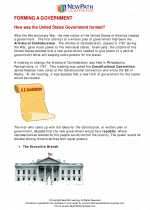 Forming a Government
Forming a Government  Worksheet/Answer key
Worksheet/Answer key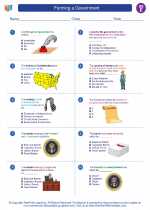 Forming a Government
Forming a Government  Worksheet/Answer key
Worksheet/Answer key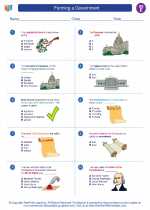 Forming a Government
Forming a Government  Worksheet/Answer key
Worksheet/Answer key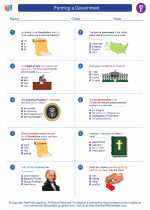 Forming a Government
Forming a Government  Worksheet/Answer key
Worksheet/Answer key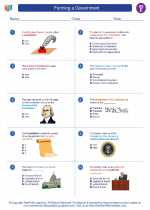 Forming a Government
Forming a Government  Worksheet/Answer key
Worksheet/Answer key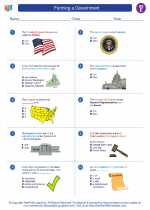 Forming a Government
Forming a Government  Worksheet/Answer key
Worksheet/Answer key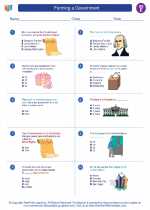 Forming a Government
Forming a Government  Worksheet/Answer key
Worksheet/Answer key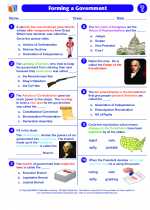 Forming a Government
Forming a Government 

 Worksheet/Answer key
Worksheet/Answer key
 Worksheet/Answer key
Worksheet/Answer key
 Worksheet/Answer key
Worksheet/Answer key
 Worksheet/Answer key
Worksheet/Answer key
 Worksheet/Answer key
Worksheet/Answer key
 Worksheet/Answer key
Worksheet/Answer key
 Worksheet/Answer key
Worksheet/Answer key

The resources above cover the following skills:
National Curriculum Standards for Social Studies (NCSS)
TIME, CONTINUITY, AND CHANGE
SOCIAL STUDIES PROGRAMS SHOULD INCLUDE EXPERIENCES THAT PROVIDE FOR THE STUDY OF THE PAST AND ITS LEGACY.
KNOWLEDGE - Learners will understand:
The history of democratic ideals and principles, and how they are represented in documents, artifacts and symbols.
POWER, AUTHORITY, AND GOVERNANCE
SOCIAL STUDIES PROGRAMS SHOULD INCLUDE EXPERIENCES THAT PROVIDE FOR THE STUDY OF HOW PEOPLE CREATE, INTERACT WITH, AND CHANGE STRUCTURES OF POWER, AUTHORITY, AND GOVERNANCE.
KNOWLEDGE - Learners will understand:
Rights are guaranteed in the U.S. Constitution, the supreme law of the land.
Fundamental ideas that are the foundation of American constitutional democracy (including those of the U.S. Constitution, popular sovereignty, the rule of law, separation of powers, checks and balances, minority rights, the separation of church and state, and Federalism).
Fundamental values of constitutional democracy (e.g., the common good, liberty, justice, equality, and individual dignity).
CIVIC IDEALS AND PRACTICES
SOCIAL STUDIES PROGRAMS SHOULD INCLUDE EXPERIENCES THAT PROVIDE FOR THE STUDY OF THE IDEALS, PRINCIPLES, AND PRACTICES OF CITIZENSHIP IN A DEMOCRATIC REPUBLIC.
KNOWLEDGE - Learners will understand:
Concepts and ideals such as: individual dignity, liberty, justice, equality, individual rights, responsibility, majority and minority rights, and civil dissent.
The origins and function of major institutions and practices developed to support democratic ideals and practices.
Key past and present issues involving democratic ideals and practices, as well as the perspectives of various stakeholders in proposing possible solutions to these issues.
National Standards for Civics and Government (NSCG)
What are civic life, politics, and government? What is civic life? What is politics? What is government? Why are government and politics necessary? What purposes should government serve?
Defining civic life, politics, and government. Students should be able to explain the meaning of the terms civic life, politics, and government. To achieve this standard, students should be able to
Identify institutions with authority to direct or control the behavior of members of a society, e.g., a school board, city council, state legislature, courts, Congress
What are civic life, politics, and government? What are the essential characteristics of limited and unlimited government?
Limited and unlimited governments. Students should be able to describe the essential characteristics of limited and unlimited governments. To achieve this standard, students should be able to
Identify historical and contemporary examples of limited and unlimited governments and justify their classification, e.g.,
Limited governments--United States, Great Britain, Botswana, Japan, Israel, Chile
What are civic life, politics, and government? What are alternative ways of organizing constitutional governments?
Shared powers and parliamentary systems. Students should be able to describe the major characteristics of systems of shared powers and of parliamentary systems. To achieve this standard, students should be able to
Describe the major characteristics of systems of shared powers, e.g., in the United States
The president and members of the Cabinet cannot be members of Congress
Powers are separated among branches, each branch has primary responsibility for certain functions, e.g., legislative, executive, and judicial
Each branch also shares the powers and functions of the other branches, e.g., Congress may pass laws, but the president may veto them; the president nominates certain public officials, but the Senate needs to approve them; Congress may pass laws, but the Supreme Court may declare them unconstitutional
Confederal, federal, and unitary systems. Students should be able to explain the advantages and disadvantages of confederal, federal, and unitary systems of government. To achieve this standard, students should be able to
Identify examples of confederal, federal, and unitary systems in the history of the United States, e.g.,
Confederal system--the United States under the Articles of Confederation and the Confederate States of America
What are the foundations of the American political system? What is the American idea of constitutional government?
The American idea of constitutional government. Students should be able to explain the essential ideas of American constitutional government. To achieve this standard, students should be able to
Explain essential ideas of American constitutional government as expressed in the Declaration of Independence, the Constitution, and other writings, e.g.,
The people are sovereign; they are the ultimate source of power
The purposes of government, as stated in the Preamble to the Constitution, are to form a more perfect union; establish justice; insure domestic tranquility; provide for the common defense; promote the general welfare; secure the blessings of liberty to ourselves and our posterity
Explain the means of limiting the powers of government under the United States Constitution
Separation and sharing of powers
Checks and balances
Bill of Rights
Explain how specific provisions of the United States Constitution, including the Bill of Rights, limit the powers of government in order to protect the rights of individuals, e.g., habeas corpus; trial by jury; ex post facto; freedom of religion, speech, press, and assembly; equal protection of the law; due process of law; right to counsel
What are the foundations of the American political system? What is American political culture?
American identity. Students should be able to explain the importance of shared political values and principles to American society. To achieve this standard, students should be able to
Explain that an American's identity stems from belief in and allegiance to shared political values and principles rather than from ethnicity, race, religion, class, language, gender, or national origin, which determine identity in most other nations
Identify basic values and principles Americans share as set forth in such documents as the Declaration of Independence, the United States Constitution, the Gettysburg Address
Explain why it is important to the individual and society that Americans understand and act on their shared political values and principles
The character of American political conflict. Students should be able to describe the character of American political conflict and explain factors that usually prevent violence or that lower its intensity. To achieve this standard, students should be able to
Describe political conflict in the United States both historically and at present, such as conflict about
Extending the franchise
What are the foundations of the American political system? What values and principles are basic to American constitutional democracy?
Fundamental values and principles. Students should be able to explain the meaning and importance of the fundamental values and principles of American constitutional democracy. To achieve this standard, students should be able to
Explain the meaning and importance of each of the following values considered to be fundamental to American public life
Justice
Equality
Openness and free inquiry
Truth
Explain the meaning and importance of the following fundamental principles of American constitutional democracy
Constitutional government which includes the rule of law; representative institutions; shared powers; checks and balances; individual rights; separation of church and state; federalism; civilian control of the military
Conflicts among values and principles in American political and social life. Students should be able to evaluate, take, and defend positions on issues in which fundamental values and principles are in conflict. To achieve this standard, students should be able to
Describe conflicts among fundamental values and principles and give historical and contemporary examples of these conflicts, such as
Conflicts between liberty and equality, e.g., liberty to exclude others from private clubs and the right of individuals to be treated equally
Disparities between ideals and reality in American political and social life. Students should be able to evaluate, take, and defend positions on issues concerning ways and means to reduce disparities between American ideals and realities. To achieve this standard, students should be able to
Identify some important American ideals, e.g., liberty and justice for all, an informed citizenry, civic virtue or concern for the common good, respect for the rights of others
Explain the importance of ideals as goals, even if they are not fully achieved
Describe historical and contemporary efforts to reduce discrepancies between ideals and the reality of American public life, e.g., abolition, suffrage, civil rights, and environmental protection movements
How does the government established by the constitution embody the purposes, values, and principles of American democracy? How are power and responsibility distributed, shared, and limited in the government established by the United States Constitution?
Distributing, sharing, and limiting powers of the national government. Students should be able to explain how the powers of the national government are distributed, shared, and limited. To achieve this standard, students should be able to
Explain how the three opening words of the Preamble to the Constitution, ''We the People...,'' embody the principle of the people as sovereign--the ultimate source of authority
Explain how legislative, executive, and judicial powers are distributed and shared among the three branches of the national government
Legislative power--although primary legislative power lies with Congress, it is shared with the other branches, e.g., the executive branch can submit bills for consideration and can establish regulations, the Supreme Court can interpret laws and can declare them unconstitutional
Executive power--although primary executive power is with the executive branch, it is shared by the other branches, e.g., congressional committees have authority to review actions of the executive branch, the Senate must approve appointments and ratify treaties, the Supreme Court can review actions of the executive branch and declare them unconstitutional
Judicial power--although primary judicial power is with the federal judiciary, it is shared with other branches, e.g., the president appoints federal judges, the Senate can approve or refuse to confirm federal court appointees, the executive branch can hold administrative hearings on compliance with regulations and laws, Congress can ''overturn'' a Supreme Court interpretation of a law by amending it
Explain how each branch of government can check the powers of the other branches
Legislative branch has the power to establish committees to oversee activities of the executive branch; impeach the president, other members of the executive branch, and federal judges; pass laws over the president's veto by two-thirds majority vote of both Houses; disapprove appointments made by the president; propose amendments to the United States Constitution
Executive branch has the power to veto laws passed by Congress; nominate members of the federal judiciary
Judicial branch has the power to overrule decisions made by lower courts; declare laws made by Congress to be unconstitutional; declare actions of the executive branch to be unconstitutional
Sharing of powers between the national and state governments. Students should be able to explain how and why powers are distributed and shared between national and state governments in the federal system. To achieve this standard, students should be able to
Explain how and why the United States Constitution provides that laws of the national government and treaties are the supreme law of the land
What is the relationship of the United States to other nations and to world affairs? How has the United States influenced other nations and how have other nations influenced American politics and society?
Impact of the American concept of democracy and individual rights on the world. Students should be able to describe the influence of American political ideas on other nations. To achieve this standard, students should be able to
Describe the impact on other nations of the American Revolution and of the values and principles expressed in the Declaration of Independence and the United States Constitution, including the Bill of Rights
What are the roles of the citizen in American democracy? What are the rights of citizens?
Personal rights. Students should be able to evaluate, take, and defend positions on issues involving personal rights. To achieve this standard, students should be able to
Identify the major documentary sources of personal rights, e.g., Declaration of Independence, United States Constitution, including the Bill of Rights, state constitutions
Political rights. Students should be able to evaluate, take, and defend positions on issues involving political rights. To achieve this standard, students should be able to
Identify major statements of political rights in documents such as the Declaration of Independence, United States Constitution, including the Bill of Rights, state constitutions, and civil rights legislation
What are the roles of the citizen in American democracy? How can citizens take part in civic life?
Knowledge and participation. Students should be able to explain the importance of knowledge to competent and responsible participation in American democracy. To achieve this standard, students should be able to
Evaluate the claim that constitutional democracy requires the participation of an attentive, knowledgeable, and competent citizenry
National Center for History in Schools (NCHS)
Historical Thinking Standards
Historical Comprehension
Reconstruct the literal meaning of a historical passage.
United States History Content Standards
Era 3: Revolution and the New Nation (1754-1820s)
The institutions and practices of government created during the Revolution and how they were revised between 1787 and 1815 to create the foundation of the American political system based on the U.S. Constitution and the Bill of Rights.
The student understands the issues involved in the creation and ratification of the United States Constitution and the new government it established.